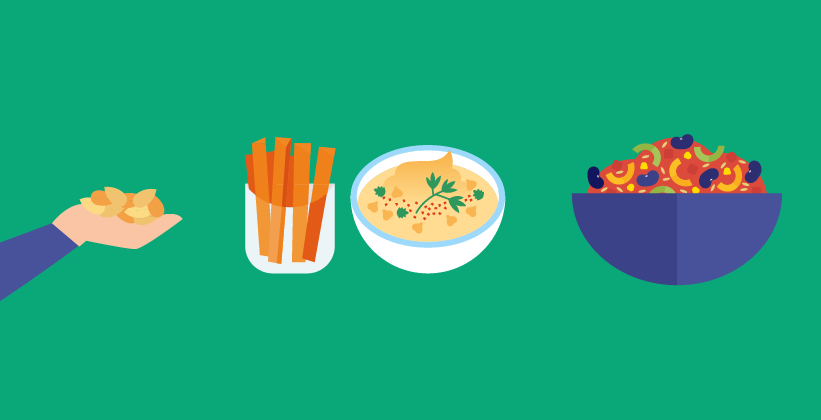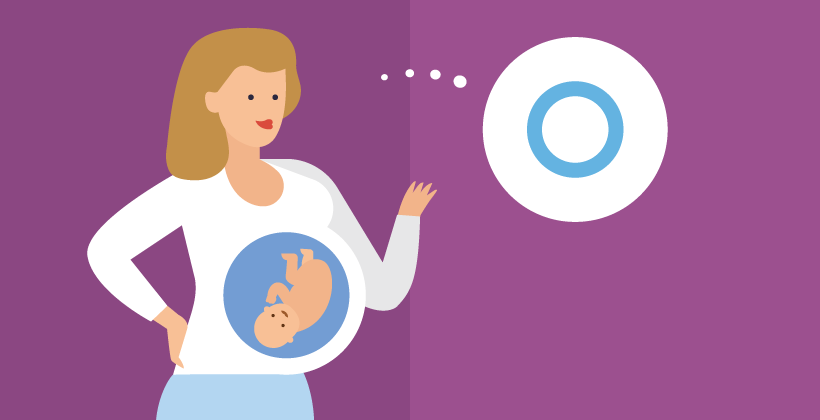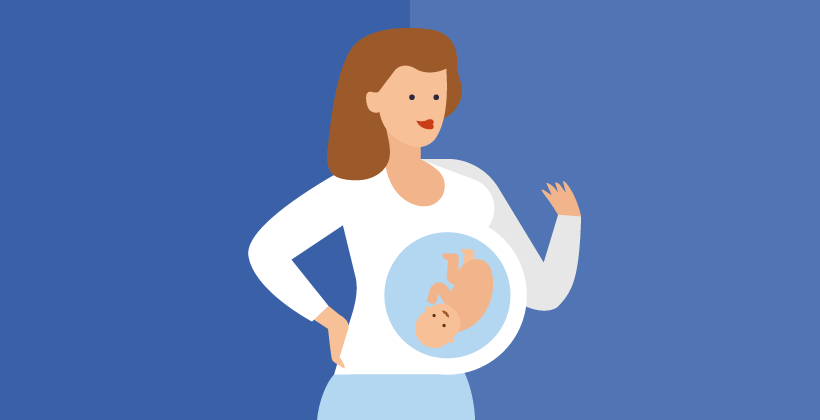Healthy pregnancy: what foods to eat when pregnant
Last Updated : 01 August 2021- What should I eat for a healthy pregnancy diet?
- Meeting your energy needs
- Grains and starches, preferably whole grain
- Eat plenty of fruits and vegetables
- Choose a variety of protein rich foods
- Eat dairy foods or fortified alternatives
- Replace saturated fats with unsaturated fats
- Drink plenty of fluids
- Should I take any supplements when pregnant?
- Folate or Folic acid
- Vitamin D
- A balanced diet for a healthy pregnancy
A balanced and nutritious diet is essential for good health, and even more so during pregnancy, as eating well will give you most of the nutrients that you and your baby need. A healthy diet and lifestyle will also help ensure a healthy weight gain, ensure you get the key vitamins and minerals you need, and reduce your risk of pregnancy complications.1
What should I eat for a healthy pregnancy diet?
Most European countries have their own food-based dietary guidelines (FBDGs), often represented as a food pyramid or food plate. Following the guidelines developed by your own country can help you get the nutrition you need during pregnancy for you and your baby.2
Just like the general dietary guidelines, during pregnancy you are advised to eat a variety of foods from each food group represented within the guidelines every day, including grains and starches, fruits and vegetables, proteins, dairy foods or plant-based alternatives, and fats and oils.
Here are some general principles to help you stick to a healthy diet during pregnancy:2
Meeting your energy needs
Energy needs increase throughout pregnancy, but it is a myth that you need to “eat for two”. Non-pregnant women need on average around 2,000 kcal (calories) per day. During pregnancy, this increases by:3
- +70 kcal/day during the first semester – equivalent to one additional slice of whole grain bread
- +260 kcal/day during the second semester – equivalent to one added bowl of fruit and yoghurt
- +500 kcal/day during the third semester – equivalent to one extra medium-sized meal
Grains and starches, preferably whole grain
Grains, especially whole grains, and starches are important during pregnancy because they provide you with carbohydrates, which our bodies use for energy, and fibre, minerals and vitamins. Try to include wholegrains, such as whole wheat pasta, brown rice, oats or other starchy foods, like potatoes at every main meal.
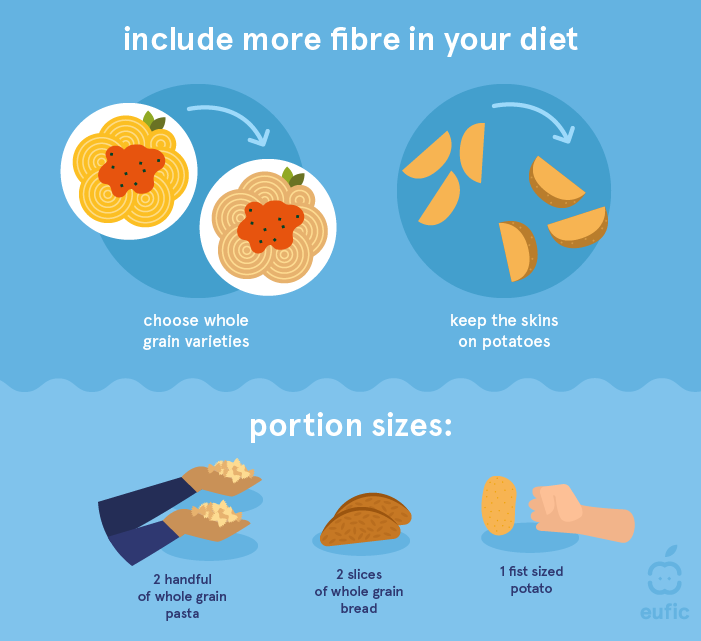
Eat plenty of fruits and vegetables
Fruits and vegetables are packed full of vitamins and minerals important for you and your growing baby. They are also rich in fibre, which, when consumed with plenty of fluids, can help to prevent constipation.4 Aim for at least five portions of around 80 g every day – around 400 g per day in total.
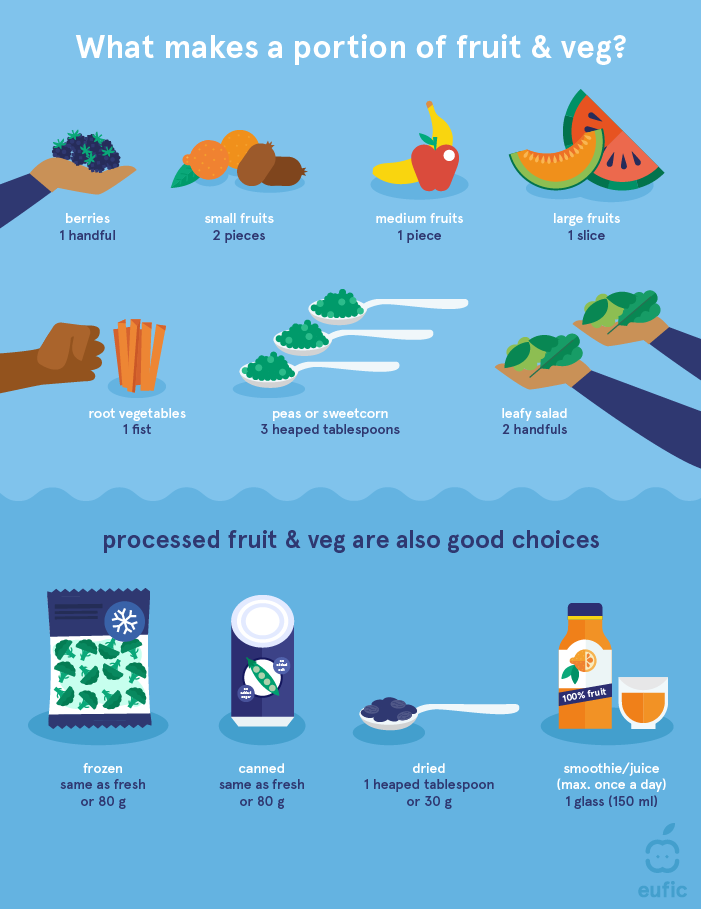
Nutrient highlight: Vitamin A
Vitamin A is essential for the development and functioning of your baby’s skin, eyes, lungs and digestive system. Vitamin A is found in foods such as liver, whole milk, and cheese. Our bodies can also make vitamin A by converting compounds known as carotenoids (such as beta-carotene) found in many fruits and vegetables like carrots, green leafy vegetables and oranges.
Although vitamin A is important during pregnancy, too much can be harmful to your developing baby.4 Therefore, during pregnancy or when trying to conceive you should avoid supplements containing vitamin A unless advised by a health professional. Liver and liver products are also best avoided when pregnant as they contain high amounts of vitamin A. See Healthy pregnancy: foods to avoid when pregnant.
Choose a variety of protein rich foods
Protein is essential for the growth and development of your baby. Eat two to three portions of protein rich foods every day including lean meat, poultry, seafood, eggs, legumes, tofu, nuts and seeds.
Consuming one to two portions of oily fish (such as sardines or salmon) per week is advised. It is best to limit oily fish intake to no more than this as some fish may contain pollutants which can accumulate with high intakes and cause a negative health effect. Avoid fish that contain high levels of mercury, including shark, swordfish, marlin and king mackerel, as they can affect your baby’s nervous system.
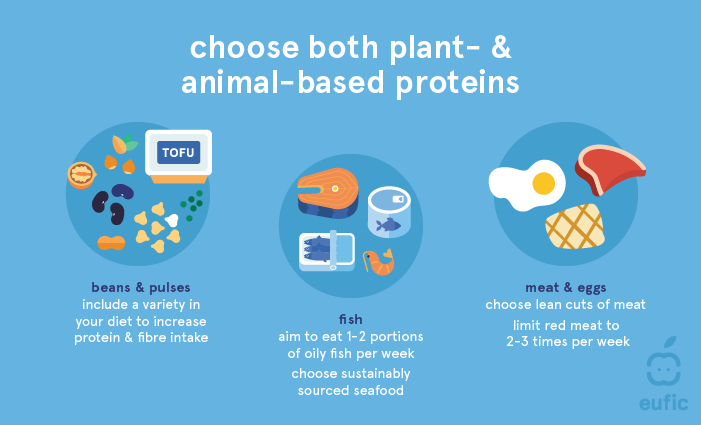
Nutrient highlight: Iron
Iron deficiency during pregnancy can impair the growth of your baby. Since many women of childbearing age may be at risk of low iron levels,4 these are often checked during pregnancy and supplements may be advised if body stores are low.
However, by focusing on eating a variety of iron-rich foods, you should be able to get all the iron you need from foods. Foods high in iron include red meat such as beef, lamb and pork. Plant sources include spinach, pulses and whole grain cereals. Iron from plant sources are less readily absorbed by the body than those from animal foods. Iron absorption can be increased from plant sources by eating them with foods rich in vitamin C, like fruits and vegetables. The European Food Safety Authority (EFSA) does not recommend an increased iron intake as a default during pregnancy.5 However, since many women of childbearing age may be at risk of low iron levels,4 these are often checked during pregnancy. Your doctor or midwife can advise you if supplements are needed.
Eat dairy foods or fortified alternatives
Dairy foods are rich in protein and many vitamins and minerals, such as calcium, iodine and riboflavin, which play an important role in pregnancy. Try to eat two to three portions of dairy foods every day including milk, unsweetened yoghurts, cheese and dairy alternatives.2 Those who choose to avoid animal products can opt for alternative plant-based calcium sources such as fortified soya or nut products.4
Many cheeses are safe to eat during pregnancy, but you should avoid soft unpasteurised cheeses as these may contain bacteria which can be harmful to your developing baby. See Healthy pregnancy: foods to avoid when pregnant.
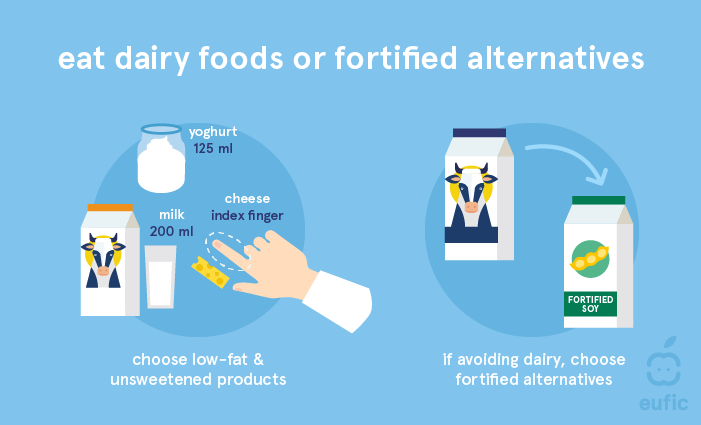
Nutrient highlight: Calcium
Calcium has many functions during pregnancy and is especially important for the growth of strong bones. Foods rich in calcium include dairy products such as milk, yoghurt, and cheese. Plant sources include tofu, green leafy vegetables and fortified foods. For most people, foods should provide all the calcium the body needs. However, calcium supplements may be advised if body stores are low or dietary intake is below recommended levels. Always consult your general practitioner (GP) before taking any supplements during pregnancy.
Replace saturated fats with unsaturated fats
Fats are an important part of a healthy diet, but not all fats have the same effect on health. You should try to limit intake of foods high in saturated fat such as fatty meats or tropical oils like coconut oil by replacing them with foods rich in unsaturated fats such as unsalted nuts, avocado, oily fish and plant oils like olive or rapeseed oil.
Drink plenty of fluids
Hydration is important for overall health. During pregnancy, drinking plenty of fluids can also help to reduce the chance of constipation and urinary tract infections.4 On average, pregnant women need around 2 litres of water per day from both food and drinks. During pregnancy, this increases to 2.3 litres per day.3 As 20-30% of the water we consume comes from foods, you should aim to drink around 1.6 - 1.8 litres of water per day – around 8 glasses.
All drinks will provide hydration, but just like the general population, you should try to limit intakes of sugar-sweetened drinks. Water is the best choice. Other drinks such as milk and caffeine-free tea are also good options. Coffee and other caffeinated drinks are safe to drink as long as you stay under the daily maximum recommended intake of 200 mg of caffeine per day – that’s equivalent to 2 cups of coffee a day.
Should I take any supplements when pregnant?
While, a healthy and balanced diet during pregnancy will provide most of the vitamins and minerals you and your baby need, for some nutrients, such as folate and vitamin D, it can be hard to get enough from food alone. Therefore, a supplement is often recommended. Always consult a dietitian or your general practitioner (GP) before taking prenatal supplements.
Folate or Folic acid
Folate or folic acid (the synthetic form of folate) helps to protect against neural tube defects (NTDs), such as spina bifida. NTDs occur when the neural tube fails to form properly during the early stages of pregnancy. This prevents the normal development of the baby’s brain and/or spinal cord. Supplementing with folic acid can greatly reduce the risk of NTDs.5,6
Folate is found in many foods such as oranges, green leafy vegetables and whole grains. Unfortunately, folate is not as well absorbed as folic acid and levels found in food are too low to reach recommended levels pre-pregnancy and during the first 12 weeks of development. For this reason, folic acid supplements are advised when trying to conceive and during pregnancy. As pregnancies can be unplanned, sexually-active women of childbearing age are advised to take a daily 400 microgram folic acid supplement.4
Vitamin D
Vitamin D has many functions in the body, including helping in the absorption of calcium and supporting the formation of healthy bones. We can get vitamin D from three places; the body can make it from sunlight, we can get it from foods such as fatty fish, eggs, and fortified foods or we can get it from a supplement.
The European Food Safety Authority recommends all adults to get 15 µg of vitamin D a day.7 During summer months most adults can make enough vitamin D from moderate sun exposure (15 – 30 minutes a day). However, during winter or for people with dark skin or limited sun exposure it can be difficult to reach recommended levels. Although some foods contain vitamin D, levels are often too low to meet our requirements. For this reason, a supplement is often recommended. A vitamin D supplement of 10 to 25 µg a day has been shown to be beneficial during pregnancy, particularly during winter months or for if you have a low level of sun exposure.4
A balanced diet for a healthy pregnancy
A healthy balanced diet should provide most of the nutrients you and your developing baby need. There is no ‘best’ diet for pregnancy but people should try to eat a variety of foods to meet their nutrient needs. Special care should be taken to eat enough foods that contain calcium, iron and omega-3 fatty acids.
References
- World Health Organization (2016) Good Maternal Nutrition, The best start in life.
- European Commission. Health Promotion and Disease Prevention Knowledge Gateway Food-Based Dietary Guidelines in Europe.
- EFSA (2017) Dietary Reference Values for nutrients summary report. EFSA Supporting Publications. 14(12):e15121
- Williamson CS (2006) Nutrition in pregnancy. Nutrition Bulletin 31, 28–59.
- EFSA (2015) Scientific Opinion on Dietary Reference Values for iron. EFSA Journal 13(10):4254.
- MRC Vitamin Study Research Group (1991) Prevention of Neural Tube Defects: Results of the Medical Research Council Vitamin Study, Lancet 338(8760):131-137.
- European Food Safety Authority (2014) Scientific Opinion on Dietary Reference Values for folate. EFSA J. 12, 3893.
- European Food Safety Authority (2016) Scientific Opinion on Dietary Reference Values for vitamin D. EFSA J. 14, e04547.

